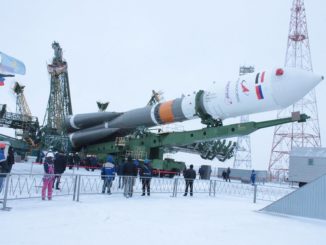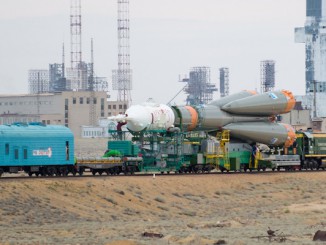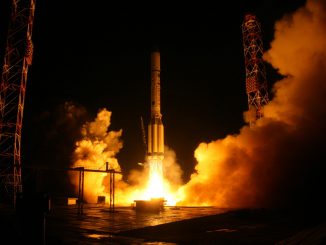
Russia’s Express AM6 communications satellite lifted off aboard a Proton rocket Tuesday and reached its targeted geostationary transfer orbit after a nine-hour climb thousands of miles above Earth.
Powered by six RD-276 engines generating nearly 2.5 million pounds of thrust, the Proton rocket launched at 1509 GMT (11:09 a.m. EDT) from the Baikonur Cosmodrome in Kazakhstan, where it was 9:09 p.m. local time.
Turning east from the historic launch base, the 191-foot-tall three-stage rocket accelerated to nearly orbital velocity — about 17,000 mph — before deploying a Breeze M upper stage for a series of four burns to put the Express AM6 satellite in the correct orbit.
Separation of the 3,400-kilogram, or 7,500-pound, Express AM6 satellite occurred at 0031 GMT Wednesday (8:31 p.m. EDT Tuesday), according to Roscosmos, the Russian Federal Space Agency.
The satellite cleanly separated into the launch’s targeted orbit, Roscosmos said.
Tuesday’s launch was supposed to be webcast by TsENKI, a Russian aerospace company which streams live video of many civilian Russian rocket launches on the Internet. But officials inexplicably canceled the video feed before liftoff.
Built by ISS Reshetnev, a Russian satellite contractor, Express AM6 will use electric thrusters to circularize its orbit over the next few months before reaching an orbital slot 22,300 miles above the equator at 53 degrees east longitude.
The satellite will begin a 15-year mission, serving government and commercial users across Russia, Europe, Africa and the Middle East with digital television and radio broadcasts, high-speed broadband Internet services, and other applications, according to the Russian Satellite Communications Co.
RSCC is Russia’s state-owned civilian telecom satellite operator.
Express AM6 will also provide mobile communications among between the Russian president and other government leaders, the RSCC says on its website.
Carrying 72 transponders in Ku-band, C-band, Ka-band and L-band, Express AM6 is based on ISS Reshetnev’s Express 2000 satellite bus.
A twin satellite named Express AM5 launched on a Proton rocket in December 2013. Another RSCC-owned Express communications satellite was lost in a Proton launch failure in May.
Canada’s MDA Corp. built the satellite’s repeater and antennas. Russia’s Radio Research and Development Institute, known by the acronym NIIR, designed and manufactured the craft’s communications payload, according to Reshetnev.
According to documents posted on RSCC’s website, the Express AM6 satellite was insured for 5.5 billion rubles, or about $136 million.



